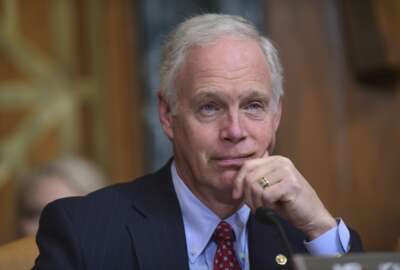Here’s one element of good government the political appointees often overlook
One of the best things a politically appointed agency head can do, but too often he or she does not, is what this guest will address. The Federal Drive with Tom...
One of the best things a politically appointed agency head can do, but too often he or she does not, is what this guest will address. The Federal Drive with Tom Temin spoke with Bob Tobias, professor of good government and long-time labor-management observer.
Interview Transcript:
Tom Temin And you have studied this because this is the time of the political cycle in the nation when some of those first term folks start to think about bailing.
Bob Tobias Yes, they do. Most political appointees, the average length is a little over two years. But most of these Biden appointees have stayed on and it looks like they’re going to stay on for the full first term. And it’s at this time when they start thinking about how do I want to be remembered? And most focus on the public policy they created because it has the greatest potential coinage for a post government resume. They know, and we know that public policy creation is how historians who write about governance and potential future employers evaluate their time in office.
Tom Temin Well, what are some of those public policy triumphs? It’s not like we’ve had a new civil rights bill of 1965.
Bob Tobias Well, but the Biden administration did initiate and Congress passed the 1.9 trillion American rescue plan, the $1 trillion infrastructure law, the first gun safety legislation in 30 years, the CHIPS Act that gave $53 billion in federal spending to manufacture semiconductor chips in the U.S. and the nearly $2 trillion Inflammation Reduction Act.
Tom Temin It’s a lot of trillions.
Bob Tobias A lot of trillions, Tom, but more importantly, it’s hundreds and thousands of pages of regulations to implement this legislation. It’s lawsuits challenging the legislation. And obviously, Congress is going to try to roll back some of those things that were passed during Biden’s time of office. So this current crop of political appointees are going to say, we were present when it happened. We were in the room where it happened. We know what the rationale is. We know who voted yes. We know who voted no. We can guide you. So hire us.
Tom Temin That’s the coin of the realm for the big law firms, the big consulting firms and the big think tanks.
Bob Tobias And universities who want to hire stars from an administration to teach their students. And what do they talk about? Public policy creation.
Tom Temin Yeah. That can get you into football coach salary territory.
Bob Tobias Yes, it can. But very few make it into football coach territory these years. So these current crop are going to be like all and they’re going to point out what they participated in. But I hope. I really do hope, Tom, that some also want to be remembered for establishing processes and procedures to make the government run more effectively and more efficiently. And one important but underutilized approach to run the government more efficiently and effectively is through the creation of collaborative labor management relationships. You know, this kind of success has no resume’ value, zero resume value, because few nonfederal employees or potential private sector employers care one whit about collaborative labor management relationships in the federal sector. But I would say that such a legacy is really commitment to political appointees who come to the federal government and say, I want to make a difference. But in their mind, when they come, it’s a public policy creation, and I suggest a focus on public policy implementation.
Tom Temin We’re speaking with Bob Tobias. He’s a former union president and retired American University professor of federal executive leadership. And let’s talk about that collaboration. But I think it’s fair to say that even the political appointees that come in and they do this resume burnishing, we should acknowledge they had some sense of serving the public in some sense of public service before coming in.
Bob Tobias No question. They did. And many of them have done a great job. I want more time. I’d like them to do more than just that.
Tom Temin All right. So tell us more about collaborative labor management and the importance of that. I mean, we’re seeing some negotiations going on right now in several agencies.
Bob Tobias There are. So there are many of these current collaborative labor management relationships that were started by political appointees in President Clinton and President Obama years that have continued to make the government work better. Now, during the president George W Bush and President Trump years, they were very much under the radar because creating and maintaining these kinds of relationships were banned. But many survived through the entire period of time because political appointee leaders, whether they were Republican or whether they were Democrat, recognized that the ability to design and implement needed change for better results occurs when federal employees, through their unions, participate in the design and the implementation of the needed change.
Tom Temin Give us some examples.
Bob Tobias Well, I don’t know whether I want to out these agency, these relationships who’ve been under the radar for so long. But there are several around that had employee initiated change and where the employer wanted to initiate change. These collaborative relationships work together to design and implement it faster without coercive bargaining. And so the benefit to the public occurred faster than in these relationships where they are at each other’s throat all the time.
Tom Temin Yes, they can’t be the agencies since you want to keep them under the hood there. But, I mean, you look at Homeland Security, you look at Social Security, you look at some of the big agencies like that. They’ve had rough times getting their basic bargaining agreement into place, hundreds of clauses, and they could be in court. And with the FLRA tied up for, you know, the six or seven or eight or 12 really key clauses in these contracts. So this must be happening kind of under the radar then.
Bob Tobias It is. I’ve been following this for many, many years and nobody ever puts out. Now, even in the Biden years, a press release saying we just worked collaboratively and implemented and saved X dollars because that just brings the wrath of so many people and so many charges. They just keep it under the radar and they just keep doing business together.
Tom Temin Do you think the fact that federal employee unions are proscribed by statute from bargaining over pay and benefits maybe focuses the discussions more on making things work better because they don’t have the abstraction of how much are you going to pay me? What can I get out of you?
Bob Tobias Well, that’s right. Pay is off the books. And so if I’m a union leader and I was a union leader, the idea of including the people I represented in solving the problems that they were facing in the workplace was a huge incentive to join and participate in the union. And they had so much satisfaction from making the workplace better, from removing the bottlenecks that always occur in any large institution. So when that happens, everybody benefits. Tom.
Tom Temin It strikes me that knowledge is good for the unions to promulgate among employees, because in the federal sector, one of the challenges for the unions, the big ones, is getting everybody as many people as possible to join and pay dues, even though those that don’t join and don’t pay dues often benefit from the bargaining agreement that’s in place anyway.
Bob Tobias That’s a fact. And if you are a bargaining unit employee and you say, well, you know, I’m really terrific. I don’t need a union as a union leader. I can say, Tom, you might not need a union, but if you really want to participate in what’s going on in the workplace, come join and I’ll put you on one of these teams to solve the problem that you’ve been complaining about now for two years. Sign up and play.
Tom Temin Yeah. Everybody thinks the five day workweek came about by natural selection or natural order of things, But maybe, maybe not.
Bob Tobias Or they think that all of this opportunity to work at home came about by magic, or just because of COVID. But the unions had been working on alternative work schedules for years and years and years, so the groundwork was laid for what actually occurred.
Copyright © 2025 Federal News Network. All rights reserved. This website is not intended for users located within the European Economic Area.
Tom Temin is host of the Federal Drive and has been providing insight on federal technology and management issues for more than 30 years.
Follow @tteminWFED





